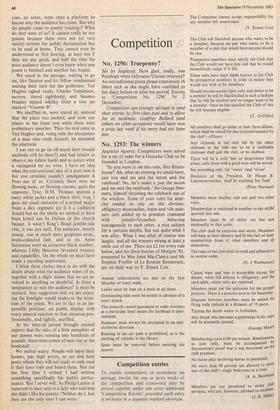Postscript
Poets Amalgamated
P.J. Kavanagh
Al this summer the 45-year-old poet Frances Horovitz lay seriously ill. She was unable to work and so was her hus- band, Roger Garfitt, who was looking after her. So some poet friends of hers decided to set up a fund, the money for which would be raised by poetry readings given free by other poets, for her sake; a pleasing exam- ple of professional self-help.
The first of these occasions took place at the Colston Hall, Bristol, which holds no less than 2,000 people. An attempt was made to fill the seats by having the pro- ceedings kicked off by Ted Hughes and rounded off by Seamus Heaney. There were luminosities of varied brightness in between but these two are the crowd-pullers, not on- ly because they are good but also because they are on the syllabus. Nevertheless, a capacity of 2,000 was a bit steep.
Backstage we enjoyed meeting each other because we are lonely, obsessed creatures, at least in our work, and seldom get the chance to meet our fellow obsessives except at readings. I think we all feel the frustra- tion of this, addresses are exchanged, rather yearningly, but we are a diffident, tentative bunch and, besides, the occasion is so queer. Behind the conviviality you can hear the doubt, as to what we are doing there at all. This time it was marginally easier — we were there to raise money for Frances, or rather, because poor Frances had succumb- ed to her illness shortly before, money for the upbringing of her young son — never- theless the doubt remained.
When a politician, a comedian, a musi-
cian, an actor, steps onto a platform he knows why the audience has come. But why do people come to poetry readings? What do they want of us? It cannot really be our poems because these were not (or very rarely) written for public declamation but to be read at home. They cannot even be understood at first hearing, at least not if they are any good, and half the time the poor audience doesn't even know when one poem is finished and another has begun.
We stood in the passage, waiting to go on, like Danton and his fellow condemned waiting their turn for the guillotine. Ted Hughes sighed vastly, Charles Tomlinson, austere, stared sightlessly, and Seamus Heaney sipped whisky from a tiny jar marked 'Vitamin B'.
We shuffled in, were stared at, noticed that the place was packed, and took our places in the front row while there were preliminary speeches. Then the nod came to Ted Hughes and, rising with the abruptness of a man who steels himself, he mounted the platform.
I was not to go on till much later (would anybody still be there?) and had leisure to observe my fellow bards and to notice what a variegated lot we were. I have no idea what the conventional idea of a poet now is but you certainly couldn't amalgamate A Poet out of us. Certainly there were no flowing locks, or flowing cravats; quite the opposite. True, D.M. Thomas sported a natty white jacket and a black shirt; true, I gave my usual imitation of a retired major from a dicy regiment (or is it a cashiered Jesuit) but on the whole we seemed to have been kitted out by Oxfam or the church bazaar. It wasn't King's Road jumble-sale chic, it was just naff. The audience, mostly young, was in much more gorgeous array, multi-coloured hair, and so on. Anne Stevenson wore an attractive black number, whereas Libby Houston favoured trousers and espadrilles. On the whole we must have made a puzzling impression.
I think these clothes have to do with the doubt about what the audience wants of us, together with a slight shame that we are in- volved in anything so doubtful. Is there a temptation to woo the audience? It must be resisted. Any suggestion that we are enjoy- ing the limelight would undercut the inten- tion of the poem. We are in fact in an im- possible position: on public display with every natural reaction to that situation pro- fessionally, and rightly, muffled.
At the interval people brought excited reports that the sales of a little pamphlet of our poems were running into hundreds of pounds, there were scenes of near riot at the bookstall....
We smiled wanly. People will leave their homes, pay high prices, to see and hear poets whom they will not read; or only read if they have seen and heard them. Not for the first time I wished I had written something specifically for public perfor- mance. But I never will. As Philip Larkin is reported to have said to a lady who told him she didn't like his poems: 'Neither do I, but they are the only ones I can write.'



























































 Previous page
Previous page